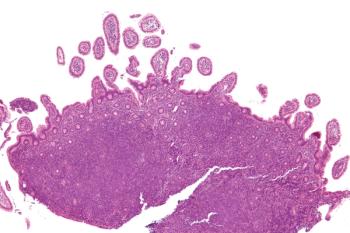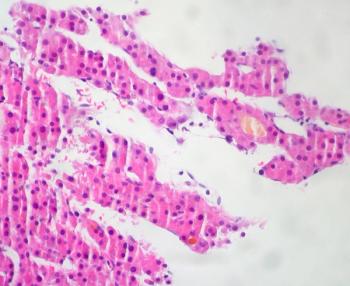
CancerNetwork® sat down with Funda Meric-Bernstam, MD, at the 2021 ASCO Annual Meeting to talk about results of the MyPathway study in HER2-positive advanced solid tumors treated with pertuzumab plus trastuzumab.

Your AI-Trained Oncology Knowledge Connection!


CancerNetwork® sat down with Funda Meric-Bernstam, MD, at the 2021 ASCO Annual Meeting to talk about results of the MyPathway study in HER2-positive advanced solid tumors treated with pertuzumab plus trastuzumab.

Oncologists can now use the International Esodata Study Group’s risk predictor model to identify patients with esophageal cancer who might be at a very high-risk of death following an esophagectomy.

Patients with EGFR wild-type non–small cell lung cancer experienced a survival benefit with the addition of plinabulin to docetaxel in the second- and third-line settings.

The mTOR inhibitor nab-sirolimus may be the first agent to receive FDA approval as therapy specifically for perivascular epithelioid cell tumors.

Women with gynecologic cancer who experience an improvement of social needs such as companionship and food insecurity could experience improved outcomes.

Tumor size and grade appeared to be associated with long-term survival in patients with estrogen receptor–positive/ERBB2-negative breast cancer who have undergone treatment with tamoxifen.

The accelerated approval status for romidepsin for the treatment of patients with relapsed/refractory peripheral T-cell lymphoma has been withdrawn following the results of the confirmatory phase 3 Ro-CHOP trial.

Myriad Genetics’ RiskScore offers personalized polygenic breast cancer risk assessment to undiagnosed women of all ancestries.

Atezolizumab, which previously demonstrated positive results in the IMpower010 trial, was granted a priority review by the FDA for use in non–small cell lung cancer.

Three-year invasive disease-free survival was associated with the use of trastuzumab emtansine in patients with HER2-positive breast cancer.

On this CancerNetwork® podcast, we examine the scientific evidence behind the National Comprehensive Cancer Network guidelines for hematologic malignancies.

For patients with pIIIA-N2 non–small cell lung cancer, postoperative radiotherapy after complete resection and adjuvant chemotherapy did not positively impact disease-free survival.

Combination ivosidenib/azacitidine has yielded notable improvements in survival over ivosidenib alone in IDH1-positive treatment-naïve acute myeloid leukemia.

Immunotherapy agent nemvaleukin alfa was granted an FDA fast track designation for the treatment of patient’s mucosal melanoma for previously undergone treatment with an anti-PD-L1 therapy.

Older adult patients with newly diagnosed high-risk or secondary acute myeloid leukemia experienced a durable survival benefit when treated with CPX-351 over 7+3 cytarabine and daunorubicin chemotherapy.

The SEQUOIA trial comparing zanubrutinib with bendamustine plus rituximab for patients with treatment-naïve chronic lymphocytic leukemia demonstrated superior progression-free survival results with the BTK inhibitor.

Compared with pivotal phase 3 trials, the use of pertuzumab in the frontline and T-DM1 in the second-line setting for HER2-positive metastatic breast cancer may lead to shorter survival outcomes.

Zanubrutinib yielded a high response rate and extended progression-free survival in patients with relapsed/refractory mantle cell lymphoma.

CancerNetwork® sat down with Jorge Nieva, MD, at the 2021 ASCO Annual Meeting to talk about the future of clinical trials for early-stage non–small cell lung cancer.

Cemiplimab for patients with either metastatic or locally advanced basal cell carcinoma showed antitumor activity in a phase 2 trial.

Racial and ethnic disparities in incidence and risk of childhood cancer have been identified across a number of malignancies.

Although pembrolizumab added to chemoradiotherapy was well tolerated in patients with stage II/III locally advanced rectal cancer, the neoadjuvant rectal score vs FOLFOX/chemoradiotherapy suggest that further study into its utility in this setting may not be supported.

Patients with Philadelphia chromosome–negative acute lymphocytic leukemia who have hypersensitivity to pegylated asparaginase may benefit from eryaspase treatment.

CancerNetwork® speaks with Kami Maddocks, MD, in part 2 of a 3-part series on CD19–directed agents and other second-line agent for relapsed/refractory diffuse large B-cell lymphoma.

Patients with non–small cell lung cancer who were treated with durvalumab plus stereotactic body radiotherapy were found to have a major pathological response and was well tolerated among the population.

Patients with hepatocellular carcinoma treated in the frontline setting showed significant improvements in overall survival when treated with donafenib compared with sorafenib.

Judd Moul, MD, discusses the gravity of new data on systemic therapies for men with castration-resistant prostate cancer and how they can be of use during the COVID-19 pandemic.

Based on detrimental effects on overall survival, the FDA has issued a safety warning for melphalan flufenamide in relapsed multiple myeloma.

Patients with muscle invasive urothelial carcinoma who received adjuvant nivolumab experienced a longer disease-free survival compared with those who received placebo.

Julie Vose, MD, MBA, a professor of internal medicine in the Division of Oncology and Hematology at the University of Nebraska Medical Center, discusses novel treatment options for patients with hematologic malignancies at the 2021 American Society of Clinical Oncology Annual Meeting.